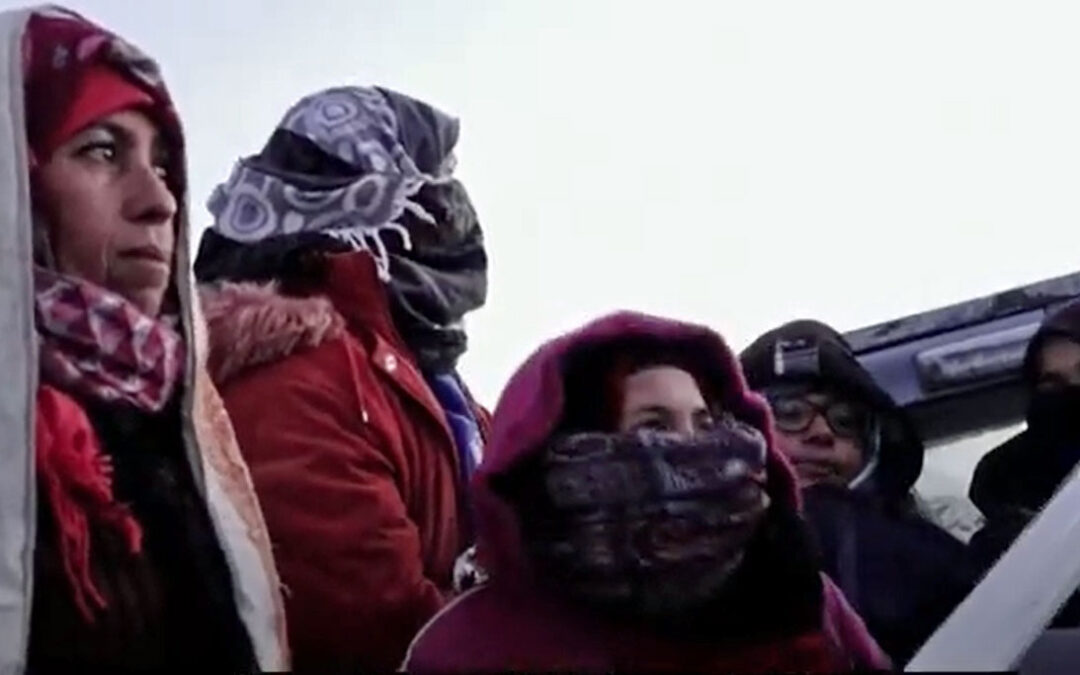
May 20, 2021
While most consumers do not think twice when they select tomatoes, grapes or other readily available fresh produce in grocery stores, many of the agricultural workers around the world who spend their days harvesting vegetables, fruits and grains to fill the plates of others often cannot afford enough to eat.
“Sometimes I might have enough money to buy bread from one of the street vendors; sometimes I might not,” says Mabrouka Yahyaoui, 73, who works in Tunisia’s agricultural fields.
Yahyaoui is among nearly 1.5 million agricultural workers in Tunisia, more than 600,000 of them women, who suffer from high heat in summer and cold rains in winter for more than 10 hours a day, for which their daily wages are between $5.50 and $6. They are forced to give a chunk of their pay for daily transport to the fields in rickety vehicles where women say they are packed together unsafely, subject to sexual harassment, injury and even death. Hundreds of agricultural workers are killed in Tunisia each year as they travel to and from the fields.
“On board the vehicle, we are crammed in like sacks of potatoes, and, worse, the men would be riding along with us,” says Afef Fayachi, a Tunisian agricultural worker. “They would touch us, use swear words, and utter obscenities. Men harass women in every way. And all we can do is suck it up and keep quiet.”
But with the support of the Tunisian General Labor Union (UGTT), agricultural workers in Tunisia are standing up for their rights to safe transport, fair wages and decent work.
‘Invisible’ Essential Workers Demand Safe Work
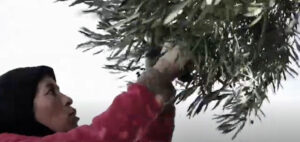
Despite lack of protections against COVID-19, agricultural workers like Yasmina Yahyaoui risked their lives to support their families.
While the world became aware of “essential workers” during the COVID-19 pandemic, many remain out of the public’s eye, struggling to support themselves with few protections against contracting COVID-19.
“I can’t afford to buy a face mask for four dinars [$1.67] on a daily basis,” says Mayya Fayachi, who, like most agricultural workers, had to risk her health to support her family. As Yasmina Yahyaoui says, “How are we going to make a living if we stay at home?”
In Siliāna, an agricultural town in northern Tunisia, the Federation of Agriculture, a UGTT affiliate, is assisting workers in understanding their right to safe transportation and social protections like safety and health measures to protect against the deadly pandemic. Together with the Solidarity Center, the union worked with the women there to create a video in which they describe the unsafe and dangerous conditions they endure to get to work and home.
“The pains, the grief and privations of these wonderful, hardworking women can be channeled, transformed, into a fabulous resistance and an overwhelming will to overcome,” says Kalthoum Barkallah, Solidarity Center senior program manager for North Africa, who has led the Solidarity Center’s outreach among agricultural workers.

The Tunisian government is taking action in response to the union campaign to improve transportation for agricultural workers.
The video is part of the union’s campaign to build public support for improving the working conditions of agricultural workers and to urge the government ensure decent transportation—for instance, by providing small business loans to local entrepreneurs to operate vehicles that meet safety standards. The new International Labor Organization (ILO) regulation (Convention 190), which covers gender-based violence and harassment at work, makes clear that employers and governments must take measures to ensure workers are safe on their work commute as well as in the physical workspace.
Since the campaign launched, the Minister of Transportation has begun work on formalizing agricultural worker transport and called on governors to form a regional advisory commission to create a new category of license permits for the agricultural sector.
The government and unions also met in March for a first-ever regional symposium organized by the Ministry of Social Affairs on social dialogue and employment relations in the agricultural sector.
Wage, Equity and Respect
The campaign builds on surveys of, and discussions with agricultural workers in Jandouba, Kasserine, Manouba, Sidi Bouzid, Siliāna and Sousse about the conditions they face on the job, including sexual harassment and other forms of gender-based violence.
Workers also have helped formulate bargaining proposals around wages and working conditions, mechanisms for dispute resolution, promotion of workplaces free of violence and harassment, as well as mechanisms for ongoing social dialogue at workplace level.
At the national level, UGTT and its civil society partners are pushing for enforcement of workplace safety inspections laws, which employers are legally obliged to undertake.
Women agriculture workers also point to the need to address disparate treatment in wages and job opportunities between men and women. “The number of daily hours a woman worker is supposed to work must be clear, and how much she gets paid for that work must be clear as well,” says one agricultural worker.”
“Why are men getting paid at least 25 dinars ($9-$10) while I get paid 15 dinars ($5.50), of which I have yet to pay for transportation?” asks Aziza Guesmi.
The bottom line, says Fayachi, is about respect: “I ask for nothing but my rights.”
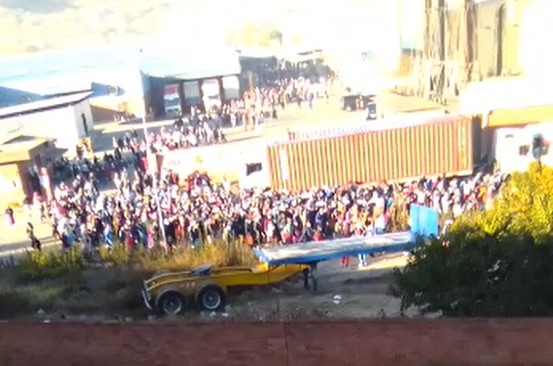
May 19, 2021
In a demonstration of Lesotho’s widely reported troubled human rights record, peacefully protesting garment workers rallying since Friday for two promised, but indefinitely delayed, minimum wage increases were met on Monday in the capital, Maseru, and surrounding areas with police violence and intimidation.
“Eight workers today were hospitalized after being shot at with rubber bullets and—in one instance—live rounds,” reported National Clothing Textile and Allied Workers Union (NACTWU) General Secretary Sam Mokhele to the Solidarity Center.
Unions say the government deployed special forces, with police shooting 12 people—including two children, ages 7 and 9—in Maputsoe and Maseru, and beating and arresting others.
“Our garment worker members, with whom we are already addressing rampant gender-based violence in their factories, want the world to know that their peaceful rallies in support of scheduled wage increases were met with outsize police violence,” says Independent Democratic Union of Lesotho (IDUL) Deputy General Secretary May Rathakan.
Lesotho’s unions, including garment workers, are imploring the government to make good on two missed incremental minimum wage increases—for 2020/2021 and 2021/2022—that were due to be implemented by government gazette publication on April 1 but have been delayed indefinitely.
“These acts had exposed the workers to absolute poverty because their current salaries cannot address their needs,” says United Textile Employees (UNITE) General Secretary Solong Senohe in a media statement.
Six private-sector Lesotho unions warned almost two weeks ago of a possible work stoppage starting last Friday should promised minimum wage increases continue to be delayed. In addition to IDUL, NACTWU and UNITE, the Construction, Mining and Quarry Trade Union (CMQ), Lentsoe La Sechaba Trade Union (LESWA) and the Lesotho Workers Association (LEWA) also protested.
Lesotho has a long history of human rights violations against political and labor activists, including police violence against peacefully striking factory workers rallying for fair wages last year. The 45th annual United States Department of State, Bureau of Democracy, Human Rights and Labor Human Rights report on Lesotho found that members of the Lesotho Mounted Police Service and Lesotho Defense Force last year committed numerous human rights abuses, including “unlawful or arbitrary killings; torture and cases of cruel, inhuman, or degrading treatment or punishment; harsh and life-threatening prison conditions [and] arbitrary arrest or detention.”
Solidarity Center Africa Regional Program Director Christopher Johnson says: “State violence in response to garment workers’ legitimate and peaceful demands for a livable minimum wage flies in the face of human rights norms.”
The right to strike has been enshrined in the constitutions of at least 90 countries and “has in effect become customary international law,” said UN rights expert and former UN Special Rapporteur on the rights to freedom of peaceful assembly and of association Maina Kiai in 2017, citing global and regional instruments that include ILO Convention No. 87 (Articles 3, 8 and 10), the International Covenant on Economic, Social and Cultural Rights (Article 8), the International Covenant on Civil and Political Rights (Article 22), the European Convention on Human Rights (Article 11), and the American Convention on Human Rights (Article 16).
May 17, 2021
A Kyiv mine worker rally protesting $71 million wage theft by state-owned coal-mining enterprises last week resulted in multiple concessions from the country’s Ministry of Energy. These included:
- Transferring more than $30 million on May 12 to state-owned coal mining companies’ accounts to pay back wages
- Directly paying back wages from the first three months of this year to non-industrial employees
- Committing to meeting regularly with the Independent Trade Union of Miners of Ukraine (NPGU) to strategize on the industry’s future
- Working with the Independent Trade Union of Miners of Ukraine (NPGU) to appropriately address low coal prices—including working toward a total ban on electricity and coal imports from Russia and Belarus, where oligarch control and failure to respect internationally accepted worker rights enables the low coal prices that are pushing Ukraine’s miners out of work.
“People who work in dangerous conditions, risk their lives every day and whose work depends on the country’s energy security must not be humiliated” said NPGU Chairperson Mykhailo Volynets during the rally.
The May 12 rally, which was located near Ukraine President Volodymyr Zelensky’s Kyiv office, brought together more than 500 mine workers from Donetsk, Luhansk, Lviv and Volyn. Protestors asserted Ukraine citizens’ constitutional right to renumeration for work performed, highlighted the difficult conditions for families of miners suffering wage theft and demanded postponement of labor-related draft laws that would eliminate labor and trade union rights. The rally follows on the heels on an 11-day protest last year over the same issues.
Energy Minister Herman Galushchenko said that, going forward, his ministry is committed to regular meetings with energy sector union leaders and miners to address long-term problems. “We are always open to dialogue and discussion of transformation concepts… But, for this, we need to work out mechanisms for constant normal communication,” he said.
In recognition of the Ministry of Energy’s concessions, NPGU suspended the protest. However, warned Volynets: “[T]he miners are ready to return with protests if the authorities, the government, the new Minister of Energy do not listen.”
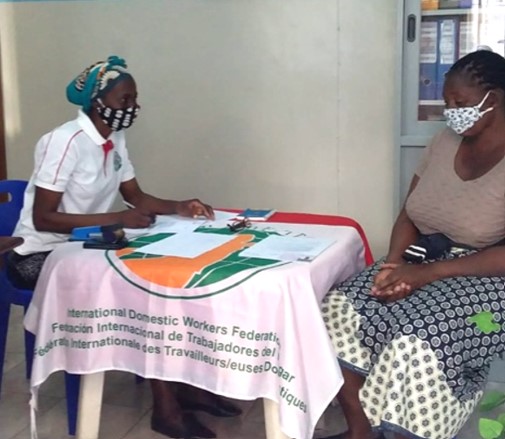
May 11, 2021
The International Domestic Workers Federation (IDWF) is urging more than 25 Africa-based affiliates to use the results of a new survey documenting the suffering of Africa’s domestic workers and their dependents during the pandemic to lobby their governments for urgent reform. Conducted by domestic workers with 3,419 of their peers in 14 African countries from November 2020 through January 2021, the survey found that only 17 percent of respondents received emergency income, food or other state-provided social support—and that most of that number received such support through another household member because they were not themselves eligible.
“It’s one thing to lose your job, it’s another thing to lose your job in a context where you don’t have access to unemployment benefits, social security or any income support,” says IDWF Lead Research Associate Louisa Acciari and post-doctoral researcher at the Federal University of Rio de Janeiro. “I think this is something where the unions can really campaign at the national level to get more inclusive social protection policies.”
Only 6 percent of those unable to work received employer-provided wages, while almost one-third of survey respondents were laid off—85 percent of whom were the main family breadwinner. They received no severance pay and remained out of work for up to six months. Nearly half of survey respondents suffered income reduction that had a dramatic impact on their household and was exacerbated by rising food and transportation costs.
During a recent event, IDWF leaders urged affiliates to use survey data in national campaigns lobbying their governments for inclusion of domestic workers in unemployment, health insurance, injury and illness compensation, and pension schemes, and for ratification of ILO Conventions ILO Conventions 189 on Domestic Workers and 190 on Violence and Harassment.
“Now we have an additional tool to fight until we get our rights, our social protections. People will remember what we say if they hear us saying [it] with numbers,” said IDWF General Secretary Elizabeth Tang.
More than 25 IDWF affiliates conducted peer-to-peer surveys in English, French, Portuguese and multiple local languages in Burkina Faso, Ethiopia, Guinea, Ivory Coast, Kenya, Malawi, Mozambique Namibia, Senegal, South Africa, Tanzania Togo, Uganda and Zambia.
“Through it all, the IDWF has shown the world that we are united,” said IDWF President and General Secretary of the South African Domestic Service and Allied Workers Union (SADSAWU). “There is much more to be done.”
Based on survey findings, IDWF recommendations include that governments:
- Conduct awareness-raising campaigns regarding occupational health and safety standards, worker rights and employer responsibilities
- Distribute personal protective equipment at key access points such as bus and taxi stands
- Introduce price controls
- Expand income-support measures to domestic workers
- Extend contributory social insurance to domestic workers
- Where absent, introduce contributory unemployment benefits for domestic workers
- Ratify ILO Conventions 189 and 190 and adopt complementary national legislation for implementing an appropriate enforcement framework
- Adopt legislative reforms to ensure effective expansion of social protection to domestic workers.
“The Impact of COVID-19 on Domestic Workers of Africa” survey is part of a global IDWF research project that includes Latin America and the Middle East and North Africa. Around the world, the pandemic has vastly widened gender, racial and economic divisions. CEOs have raked in record profits during the pandemic, and 8 of the 10 wealthiest people in the world have grown billions of dollars richer over the past year. On the other side, domestic workers, agricultural workers, trash collectors, street vendors and a growing number of gig workers employed through app-based services were recognized as essential over the last year and hailed as heroes, yet are among the most economically undervalued and underserved. The COVID-19 crisis cost women around the world at least $800 billion in lost income in 2020, equivalent to more than the combined GDP of 98 countries, said Oxfam last month.
The Solidarity Center partners with the IDWF around the world, supporting domestic workers’ efforts to access their rights. As of April 2021, the IDWF has 81 affiliates from 63 countries.
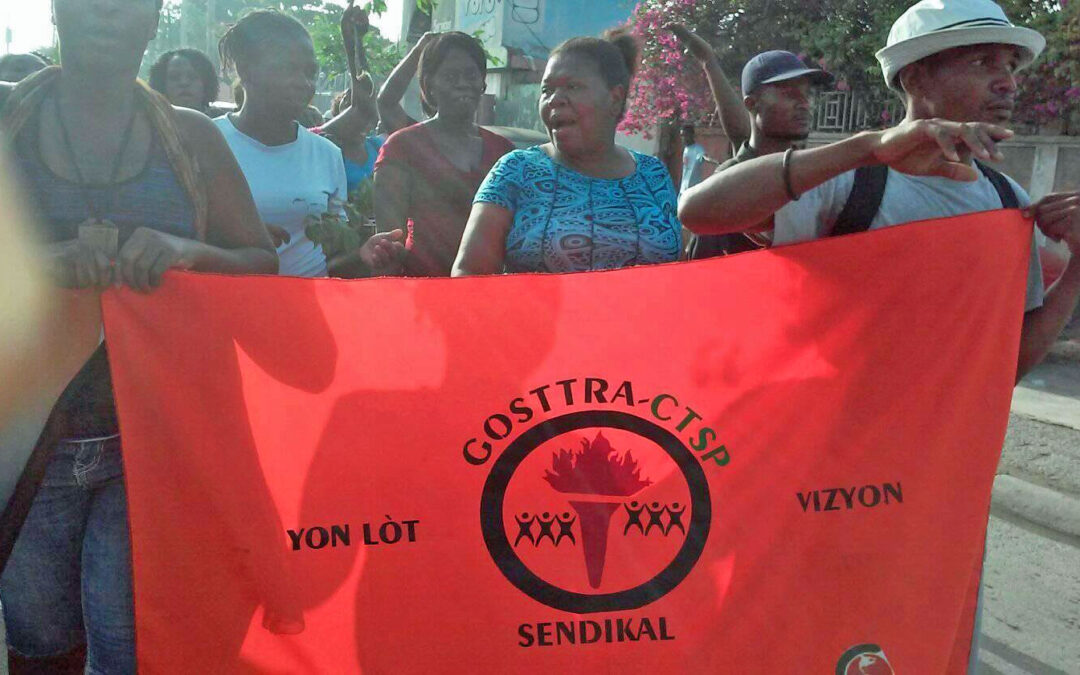
May 6, 2021
Garment workers and their union in Haiti are hailing a landmark settlement with a factory in Port-au-Prince that provided a total of $15,480 in back pay to 1,200 workers. The compensation covers 20 percent of the amount the employer deducted from workers’ paychecks for health care coverage by the government agency, OFATMA, but failed to pay to the agency. Haitian law requires employers to register workers in the system, deduct six percent of pay (split between employer and employee), and forward the contribution to OFATMA in a timely fashion.
The settlement follows the death of Liunel Pierre, a garment worker, who died in July 2020 after being denied life-sustaining dialysis treatment due to a lack of accrued health care funds.
After Pierre’s death, the Association of Textile Workers Unions for Re-importation (GOSTTRA) demanded the employer immediately remedy its failure to contribute to workers’ health insurance. After a weeks-long work stoppage, GOSTTRA members successfully brought management to the table. The settlement also covers many workers laid off during the pandemic and GOSTTRA is working with the employer to establish processes to contact the laid-off workers so they can receive the reimbursement.
Union advocates say this is the first time a Haitian garment sector union successfully negotiated a financial settlement agreement on behalf of workers and is holding the employer accountable without international or fashion brand intervention.
With Solidarity Center support, GOSTTRA printed fliers to publicize the settlement among workers that detailed the payment they should receive, accompanied by megaphone announcements at the factory. GOSTTRA is monitoring management’s action to ensure it correctly reimburses the workers.
Few factories in Haiti make the required contributions to the health or pension funds in accordance with the law, threatening the ability of workers to access health care. The International Labor Organization (ILO)’s Better Work Haiti (BWH) has reported continuous and widespread noncompliance for 10 years. In its most recent report, BWH found that 84 percent of employers did not comply with legal requirements for social benefits between October 2019 and September 2020.
In the same month as Pierre’s death, another garment worker, Sandra René, died from pregnancy complications after she also was turned away from the hospital where she sought medical care. As in Pierre’s case, the factory had deducted funds from her paycheck for health coverage, but failed to consistently pay into the system. Hundreds of garment workers marched with René’s casket in a funeral procession to OFATMA offices to protest her death.
Little Job Security for Garment Workers in COVID-19
GOSTTRA’s success comes as Haiti’s textile industry struggles to recover from diminished demand during the COVID-19 crisis. Workers still face layoffs and reduced working hours, with roughly a third of the 57,000 workers in the country’s garment industry suspended or terminated. Increasing violence in the country threatens workers’ ability to safely travel to work, further disrupting factory operations. Further, employers are clamping down on GOSTTRA union leaders who are trying to defend their members’ interests.
The victory also comes in an environment in which Haitians face increasing gang violence, kidnappings, and political polarization. Few elected officials remain, following the President Jovenel Moise’s dismissal of the lower Chamber of Deputies and mayors across the country. Thousands have marched to protest widespread assaults on the country’s democratic processes, and journalists and others taking part have been targeted by arrests and police violence. Last month, police fired tear gas into a church where Haitian bishops led a “Mass for the freedom of Haiti.”
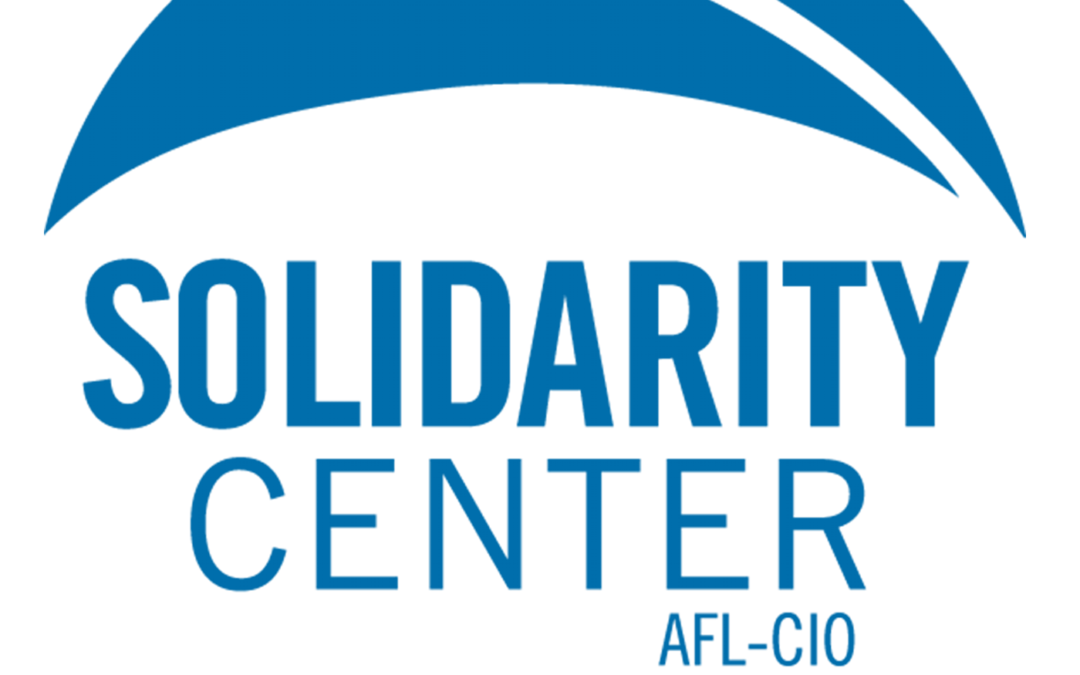
May 5, 2021
The Solidarity Center is honored to announce that two dynamic leaders from within the U.S. labor movement have joined its Board of Trustees.
The new members are Gabrielle Carteris, president of the Screen Actors Guild-American Federation of Television and Radio Artists (SAG-AFTRA) and Alvina Yeh, Executive Director of the Asian Pacific American Labor Alliance (APALA). They will join current Board of Trustees members guiding the Solidarity Center as it strives to empower workers to raise their voice for dignity on the job, justice in their communities and greater equality in the global economy.

SAG-AFTRA President Gabrielle Carteris. Credit: SAG-AFTRA
Gabrielle Carteris became SAG-AFTRA president in 2016, after serving two terms as executive vice president. She became a household name playing Andrea Zuckerman on Beverly Hills, 90210 and recently starred in BH90210, a revival of the iconic show. Her extensive resume includes work in television, film and the stage, with recent credits including a recurring role on Code Black and guest-starring roles on Criminal Minds, Make It or Break It, The Event, Longmire and The Middle. As a producer, Carteris created Lifestories, a series of specials, and Gabrielle, a talk show that she also hosted. In her role as SAG-AFTRA president, Carteris chairs the National TV/Theatrical Contracts Negotiating Committee and leads the President’s Task Force on Education, Outreach and Engagement. She represents SAG-AFTRA with the International Federation of Actors (FIA), where she works to bring actors together across borders.

APALA Executive Director Alvina Yeh. Credit: APALA
APALA Executive Director Alvina Yeh. Credit: APALAAlvina Yeh serves as the Executive Director of the Asian Pacific American Labor Alliance (APALA) and Institute for Asian Pacific American Leadership & Advancement (IAPALA). Originally from Colorado, she comes from a Chinese family who fled from the war in Vietnam. Alvina, a lifelong community organizer with experience in electoral and issue-based campaigns, has a career committed to social justice. She is deeply passionate about building a movement where everyone has a fair shot in a thriving society, and brings an international lens on human and worker rights to the work of APALA. Yeh currently serves as the Co-Chair of the National Council of Asian Pacific Americans (NCAPA) and serves the Congressional Progressive Caucus Center Advisory Board and the National Korean American Service & Education Consortium Action Fund (NAKASEC AF) Board.
“I am thrilled that President Carteris and Executive Director Yeh are joining our Board,” said Richard L. Trumka, president of the AFL-CIO and chair of the Solidarity Center Board of Trustees. “They bring important and diverse points of view and a deep commitment to the Solidarity Center’s mission to support worker rights around the world, for everyone. We look forward to their contributions.”
Shawna Bader-Blau, executive director of the Solidarity Center said: “The Solidarity Center is dedicated to building cross-movement relationships and strengthening the connections between workers in the United States and workers around the world. So we are excited to begin work with these two labor leaders who bring a passionate interest in worker rights, additional connections to the U.S. labor movement and a wealth of experience in organizing, international solidarity and power building for workers in the United States and beyond.”
The Solidarity Center is the largest U.S.-based international worker rights organization helping workers attain safe and healthy workplaces, family-supporting wages, dignity on the job, widespread democracy and greater equity at work and in their community. Allied with the AFL-CIO, the Solidarity Center assists workers across the globe as, together, they fight discrimination, exploitation and the systems that entrench poverty—to achieve shared prosperity in the global economy.









